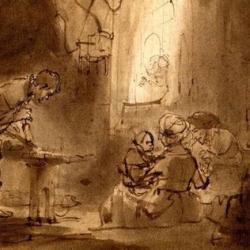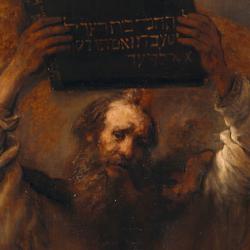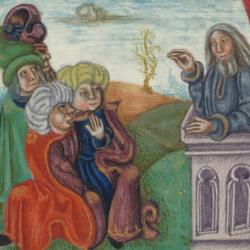At Theopolis this week, we spent a long time poring over the strange episode in Exodus 4:24-26. Moses is returning from Midian to Egypt, and stops at a lodging place, where “Yahweh met him and sought to put him to death.” Zipporah saved the day by circumcising Gershom, spreading the blood of circumcision on “his feet,” and calling someone a “bridegroom of blood.”
In context, it serves, as James Jordan argues, as a preview of Passover. The blood of a son defuses a threat. Jordan also argues persuasively that the regulations of Deuteronomy 22 are in play, according to which a woman has to show bloody bedsheets from her wedding night to prove her virginity.
The details of the passage raise some puzzles, though. It starts with the attempt to identify who precisely is under threat – Moses or Gershom? It makes some sense to say that Moses is the one threatened, and that the blood of his son rescues him from the threat. But that breaks the analogy with Passover; sons, not fathers, are threatened at Passover. If we say that Gershom is the one under threat, then we have the strange result that the son’s own blood rescues him from death. Either way, this episode is striking in the fact that human blood, rather than the blood of an animal, propitiates the threatening God.
Perhaps we can make some initial sense of that by noting that human death can be liberating in the Old Testament system. The death of the high priest opens the city of refuge. Moses’ own death is linked in Deuteronomy-Joshua with Israel’s release from the wilderness into the land. Gershom doesn’t die, but he does shed blood, and the blood of the firstborn releases Moses and his household from the refuge city of Midian back into the land of Goshen.
And then we can think typologically: Animal blood is the normal means of cleansing and atonement in the Old Testament, but that animal blood is a figure for the human blood of Jesus the Lamb. If we press the typology of Exodus 4, though, it seems that the blood of the son not only rescues the household but is the means of his own rescue. Might we say that Jesus’ blood is liberating not only for His people but for Himself? Jesus needs no cleansing because He has done no sin, but might we say that His obedience to death – evidenced by blood – is the righteous act that the Father rewards with resurrection? Does Jesus’ blood rescue Him by making Him the slain Lamb worthy to receive all honor and glory and dominion and blessing?










